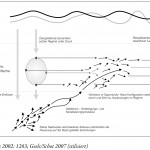Splitter: Mythos Digital Natives
Jan-Felix Schrape | 3. August 2017Seit dem mittlerweile allseits bekannten Aufschlagstext (2001) von Marc Prensky hat die Unterscheidung von »Digital Natives« und »Digital Immigrants« eine erstaunliche diskursive Karriere hingelegt.
»What should we call these ›new‹ students of today? Some refer to them as the N-[for Net]-gen or D-[for digital]-gen. But the most useful designation I have found for them is Digital Natives. Our students today are all ›native speakers‹ of the digital language of computers, video games and the Internet.
So what does that make the rest of us? Those of us who were not born into the digital world but have, at some later point in our lives, become fascinated by and adopted many or most aspects of the new technology are, and always will be compared to them, Digital Immigrants.«
Ein in diesem Sommer erschienener feldüberblickender Artikel (Kirschner/Bruyckere 2017) kommt nun allerdings zu dem Schluss, dass es diesen in den Feuilletons und in den Sozialwissenschaften vielreferenzierten, technikkompetenten und zum ständigen Multitasking befähigten »Digital Native« realiter gar nicht gibt:
»As has been shown, there is quite a large body of evidence showing that the digital native does not exist nor that people, regardless of their age, can multitask. This corpus of research also shows that though learners in this generation have only experienced a digital connected world, they are not capable of dealing with modern technologies in the way which is often ascribed to them (i.e., that they can navigate that world for effective and efficient learning and knowledge construction).
Finally, the research shows that these learners may actually suffer if teaching and education plays to these alleged abilities to relate to, work with, and control their own learning with multimedia and in digitally pervasive environments.«
Siehe dazu auch: Kommunikation und Partizipation im Social Web, Kap. 9 sowie
Mobile Medienkonvergenz — infrastrukturelle Macht — Daten- und Informationskompetenz













